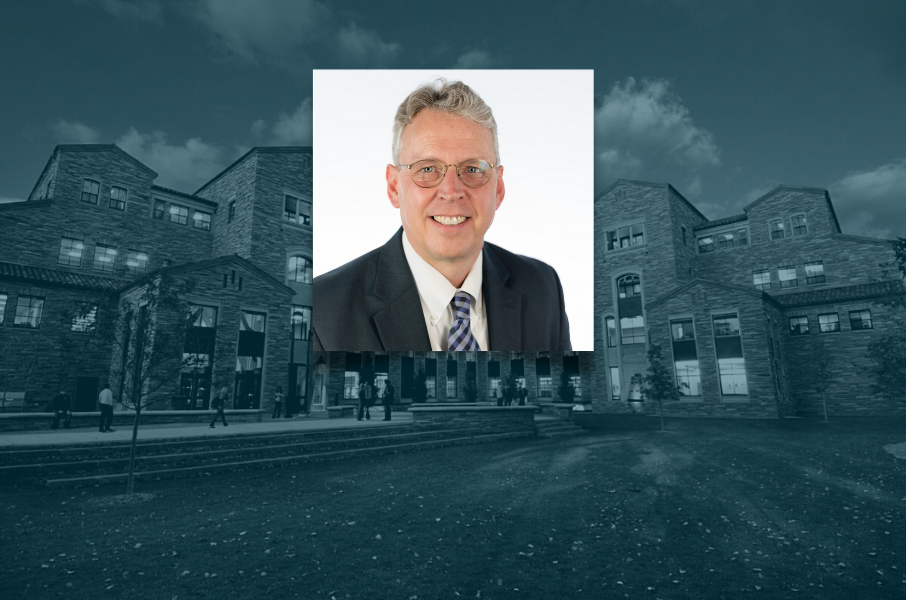The Graduate School of Banking at Colorado (GSBC) Board of Trustees in November 2020 announced the school’s incoming president, Michael Stevens. In January 2021, Stevens began collaborating with the school’s board, staff and faculty to design its 70th Annual School Session.
On May 1, Stevens joined the GSBC staff full time and is working in tandem with long-time GSBC President Tim Koch. Stevens will take the lead as president on August 1 at the conclusion of the Annual School Session, which will be the first virtual and in-person combined session in the school’s history. Learn a little more about Stevens and his vision for the future of the school and community banking below:
Q: Can you provide a little bit of background on yourself?
A: I just finished a 21-year career with the Conference of State Bank Supervisors (CSBS) in Washington, D.C. CSBS advocates for state bank regulators with the federal government and provides training for examiners. While I live in the D.C.-metro area, I am a Midwesterner at heart, having been born in Iowa and raised in Nebraska. Out of college, I started my career as an examiner in Iowa. I’ve been around community banking for my entire career and feel very fortunate that I have been able to progressively build on my experience.
Q: Beyond your involvement as a faculty member since 2004, what drew you to GSBC?
A: When I first joined CSBS in late 1999, there was an existing relationship between the two organizations. They jointly developed content and had a common board member. The first thing that struck me about GSBC was the strong, loyal alumni network. I have travelled all over the country with CSBS and GSBC alumni are everywhere. This has shown me that there is a legitimate excitement and passion for GSBC. Second, GSBC has a long history of serving the industry. Founded 70 years ago by the Colorado Bankers Association and the Board of Regents, the school has a clarity of purpose. GSBC provides education and a network of support for community bank leaders. Why? Because of what these bankers do in the markets they serve. Community banking, at its core, is about agriculture, small business and home ownership. It is about economic development, jobs and civic leadership. Banking is as central to the economy as it is the founding of this country, and GSBC knows that.
Q: What do you think are the most critical issues facing community banks?
A: Most banks in this country serve a defined marketplace, yet operate in a very complicated, messy world. For example, community banks have no choice but to learn how to defend against cyber-attacks. International events which are interesting on the news have a downstream impact, from the blockage of the Suez Canal to a cyber-attack on the Colonial pipeline, we are all impacted even if we don’t realize it. Community bankers have a broad array of risks they must manage beyond traditional banking. But here is the upside: the more complicated and riskier the world gets, the more important “local” becomes. Where do people go when the world doesn’t make sense? They turn locally. We have seen it with the dotcom bust, 9/11, the mortgage and financial crises and the pandemic. Local matters. Local is where you turn when you want stability and sensibility, and that’s what community banks provide. An academic friend of mine groups farmers’ markets, craft breweries and community banks together. And, when you think about that, what’s not to love about any of them?
Q: What do you see as GSBC’s role in addressing these issues?
A: I think what the critical issues show is that it is more important to teach bankers how to think through complicated questions than just “how to do.” There will certainly be different challenges in 10 years. While I have little certainty about what they will be, GSBC can offer the experience and the network to work through them. GSBC has an afternoon session this year for second- and third-year students titled “Hard Questions.” The premise of this class is that as a leader, you won’t get any of the easy stuff. Instead, you get the questions others don’t want to answer, but that need answered, nonetheless. These questions require leadership, and what GSBC does is educate the next generation of community bank leaders. Today, those questions center around climate risk management, diversity and inclusion, crypto-currency and the workplace of the future. Next year, the questions may be entirely different, and GSBC’s curriculum will again be designed to address them.
Q: What are you most looking forward to as GSBC’s president?
A: I have referred to this as “Phase Three” of my career. People seem to increasingly view sticking to the same profession for your full career as a waste or short-sighted, but I value it tremendously. I am very excited for this opportunity. GSBC and all the banking schools have an impact on the industry and communities for generations. I work with a talented, experienced staff that knows it is making a difference. Becoming GSBC’s president is an honor and a privilege.
A record-setting number of virtual and in-person students will attend classes from July 18-30, 2021. GSBC has instated numerous changes to its session to accommodate both virtual and in-person audiences, including a new peer group program to facilitate relationship building among new students and enhanced health and safety measures for on-campus students.

